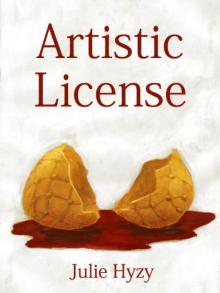- Home
- Julie Hyzy
Grace Interrupted Page 13
Grace Interrupted Read online
Page 13
A little voice whispered: Enough to give up your house, your roommates, your independence?
“Try it,” Bennett was saying. “It will take time. A few weeks at least, but don’t give up. I believe your body will eventually adjust—although you probably will have to blow your nose every morning.”
“I hope you’re right about all that. She’s such a cutie.”
The conversation turned to the new arrival—this time not an animal, but the item Bennett had recently purchased at auction. “You’re going to love it,” he said, his eyes sparkling.
My interest had been piqued from the moment he’d first mentioned it. Now I was practically ready to burst. “What is it?”
“Nope. Not yet. You’ll have to wait.”
I remembered Frances’s pronouncement that if Abe had been here, he’d have been fully informed. Why keep it from me, then? I tried to force Frances’s admonishments out of my mind while maintaining a cheerful air. But I had to ask, “Why the big secret?”
“Well,” he drew out the word, “this is special. Any other time, I would have told you right off the bat.”
“Really?”
“Why wouldn’t I?” he asked rhetorically. “But this time I want to see your face when it comes in. It’s due to arrive tomorrow. I’ll let you know when it gets here and we’ll check it out together.”
Curiosity had me in its tantalizing grip. “Not even a hint?”
“Sorry, Gracie,” he said with a grin, “you’ll just have to wait.”
Chapter 15
LATER THAT AFTERNOON WHEN I KNEW THE Living History would be open to the public, I called down to maintenance to request a ride to the site. Except for the manor’s shuttles, vans transporting staff members to and fro, and of course, Bennett’s cars, we tried our best to keep motor vehicles out of our guests’ sight. The idea was to encourage visitors to experience the manor as its first guests had experienced it, back in the day when horses and buggies were the only real means of transportation. I supposed in many ways we at Marshfield weren’t all that dissimilar from the Civil War groupies. We wanted people to let go of the real world for a little while—to be transported from the craziness of the twenty-first century. To play pretend.
When one of Marshfield’s white minivans pulled up at the back door, I was surprised to find Davey at the wheel. The enormous bandage had been replaced by a much smaller, flesh-colored strip across the center of his nose. “How did you get roped into this job?” I asked as I climbed into the passenger seat and rolled down the window. Too beautiful a day to keep the weather out.
He shrugged. “Guess the rest of the gardening staff doesn’t want me around.”
“I don’t believe that for a minute,” I said. He put the van into drive and I asked, “No other passengers?”
He gave a short, mirthless laugh. “No.” A young man of few words, he shook his head as he pulled out. We cleared the ornamental iron gate that separated the manor house from the rest of its expansive grounds. He had his right hand draped over the wheel, his left elbow perched on the open window. “You don’t have to do that, you know,” he said.
“Do what?”
“Always try to cheer me up. I’m not blind or just feeling sorry for myself. I know that I’m doing a decent job on whatever projects Jack assigns, but the guys I’m working with?” He extended his fingers in emphasis, the heel of his hand guiding the car as he explained, “They’re convinced I killed that Civil War dude. You can see it in their faces and they all try to steer clear of me.” Keeping his eyes on the road, he gripped the wheel again, hard. “Can’t really blame them, I guess. I’m bad news.”
I didn’t know what to say to that.
“Jack talked to the head of maintenance so maybe I could get some other training. Maybe learn a new skill or something. The guy in charge was cool about it.” Still not looking at me, he added, “I can’t keep a job myself. If it wasn’t for Jack . . . ’Course, look at the job the guy gave me. No contact with visitors, hardly any contact with staff.” His mouth twisted downward and he gave another unhappy laugh. “Let’s keep everybody safe from the lunatic.”
I started to argue, but that would just be me trying to cheer him up again. Instead I took a different approach. “How is it,” I asked, “living with Jack?”
For the first time he turned to look at me. “Why? You thinking about moving in with him?”
“No. No. I was just making conversation.”
He’d returned his attention to the road but glanced at me again. “You’re blushing. You like him, don’t you?”
“Does it matter?”
“If you wanted to move in with Jack, I’d find somewhere else to live.”
“I’m not looking to move in with Jack,” I said, exasperated. “We haven’t even gone out on a date yet.”
“Yeah, I know. Sorry. I shouldn’t tease you.” The hint of a smile curved his lips. “To answer your question, living with Jack is all right, I guess. He’s clean. He cooks, too. That’s cool.”
So far, this was more than Davey had ever said to me at one time. I had a feeling he wasn’t finished.
“Jack’s a good brother. He sure cuts me a lot of slack. I don’t know if I’d be that nice to somebody like me. I’m trouble. But he still always looks out for me. Sometimes too much, and it bugs me. But I can’t really blame him for that. I’ve sure given him plenty of reason to worry.”
We were silent for a long moment as the van eased up a small rise in the road and passed beneath a canopy of tall maples, giving us a brief respite from the sun.
“I need to find my way,” he said quietly. “It’s tough.”
We were silent again. “I hear you,” I said finally. “I’m still finding my way.”
“You?” He turned to me in disbelief. “You’re the boss here.”
“ So?”
“They wouldn’t have hired you for your job if you didn’t know what you were doing.”
Davey must not have heard the circumstances behind my promotion. “I’ve got news for you,” I said, “a lot of people don’t know what they’re doing. Some of us just hide it better than others. But I’ve learned a lot about myself these past few months.” Taking a deep breath of the crisp air, I added, “Something about this place brings out the best in me.”
“You’ve got everybody fooled then. You come across like Wonder Woman.”
“Yeah, right.” I had no idea why I felt comfortable opening up to Davey, but I plunged on. “The truth is, I’m just struggling to be the person everybody thinks I already am.” I gave a low laugh, though this was anything but funny. It was truth as bare-bones as it could be. “I often feel as though I’m living two lives. One is the façade that everyone sees, and the other is trying desperately to make that façade come true.” I sighed. “That probably doesn’t make any sense.”
Still facing forward, he gave a brief nod. “Makes more sense than you know. I feel like that, too.” A moment later he added, “Jack’s probably the best person on the planet. He’s good, you know? Genuine.”
“He doesn’t face the same struggles?”
“Jack went through a lot when . . .” Davey took a breath. “He went through a lot last time. I can’t even imagine . . .” He let the thought trail off just as we reached the encampment. I wanted to hear more, but Davey’s expression darkened. “He turned his life around though; wish I could do the same.”
“You were so young when everything happened. Last time, I mean.”
Davey’s eyes clouded. “Not young enough.”
I wondered what he meant by that but before I could press him, Davey had put the van in park and shut it off. “I’m going in there, too,” he said by way of explanation. “I want to see what it’s all about. Sounds kind of interesting.”
The killer always returns to the scene of the crime. The thought popped in, unbidden. “Oh, sure,” I replied blandly, taken aback by his pronouncement. I didn’t know how to broach the next delicate question. If he thought hi
s coworkers suspected him, he was in for far more scrutiny from the re-enactors who had all heard about the skirmish the day of Zachary’s death. “But aren’t you afraid . . .”
“That people will have a problem with me strolling around?”
“Yeah.”
He dug a baseball cap out from his back pocket and snugged it over his head. “I can’t wear sunglasses for a couple of days yet—doctor’s orders—but I think I’ll be fine. None of these folks have actually ever met me. I’d be surprised if anyone even gives me a second look.” He rubbed his clean-shaven face. “Especially now. Nobody really ever does. I kinda blend, you know?”
The only person who had seen Davey close-up was Pierpont, and that was when Davey still had his beard. With that gone, and the addition of the hat, he should be safe.
“Anyway,” Davey continued, “I think this Civil War thing sounds like fun.”
Fun. Although I’d known the young man only a short time, I sensed he rarely found life “fun.” “It does,” I agreed.
As we descended the hill to enter the re-enactors’ camp, Davey stopped and looked around. “Way cool,” he said, stepping into the crowd.
“Have a good time.”
He started away, then called for me to hold up. “Here you go,” he said, handing me the keys to the van.
“But . . .”
“I’ll find my own way back. I left a note with the maintenance guy. Told him thanks but no thanks on this job. I’ll give my notice to Jack later today. I guess that means I’m telling you now, huh?”
Stunned, I said, “But Davey, you were doing so well.”
“No,” he said, “you just wanted to believe I was. Thanks for your support, Grace. I really do appreciate it.”
“Yeah, of course,” I said, but he’d already turned away, setting off for the far end where the Confederate tents were set up.
Chapter 16
I ENTERED THE LIVING HISTORY STUNNED BY Davey’s abrupt resignation. There was more going on than he let on, of that I was sure. I sighed. With him no longer employed at the manor, I might never find out what it was.
There were so many visitors—easily distinguishable from the re-enactors by virtue of their contemporary clothing—that it looked more like a giant block party than a soldiers’ camp. Surrounded by tourists in capris and sports jerseys consulting BlackBerrys, Civil War women carried pots and baskets, their skirts generating little puffs of dust as the material skimmed the ground. Even though the re-enactors had only been here since Friday, patches of grass had already been worn down to bare dirt. The participants concentrated on their tasks, but seemed happy—eager, even—to take the time to answer questions whenever a T-shirt-clad tourist stopped them to talk. The sutlers in the very center of camp were doing a brisk business. No wonder the re-enactors, for all their disparagement of “farby,” chose to open their camp to the public from time to time.
I had no difficulty finding Rob Pierpont. Standing at the northeast corner of the camp with his arms folded and an intense expression on his face, he looked exactly the way I would have expected a high-ranking officer to look. His buttons and decorations contrasted brightly against the dark blue of his jacket. Although the temperature was only in the seventies, he had to be sweltering under all that wool. Plus, he wore a hat and boots. Angled as he was toward the gathering, he didn’t see me approach.
Pierpont wasn’t a tall man. But what he lacked in stature he made up for in his bearing. Nodding and murmuring greetings to passersby as they said hello, he stood with his feet shoulder-width apart, his gaze darting from spot to spot to spot, surveying everything with keen interest. He reminded me of a chubby, bearded meerkat. In uniform.
“Mr. Pierpont,” I said.
He turned, smiling when he saw me. “Good afternoon, Ms. Wheaton. What brings you here today?”
“I’m sorry to bother you. Are you allowed to talk with me? Or is that . . . farby?”
“Of course I can talk with you. That’s part of what Living History is all about. We strive to educate nonmembers. Who knows, we might even entice you to join us in future outings.”
“You never know,” I said. Not a chance, I thought. “I spoke with the police about your concerns.”
“And?”
“It’s up to them now. I offered them a location to use off-site, but I don’t know how convincing I was.”
“Thank you for your efforts, Ms. Wheaton,” he said. “I truly appreciate it.”
“By the way,” I continued, “do you remember Davey, the young man Zachary Kincade attacked?”
“He and I were never introduced, if that’s what you mean, but I do recall the incident.” Pierpont fixed me with a quizzical stare. “Why?”
Despite Davey’s attempts to wander incognito there was still a chance, however slight, Pierpont might recognize him. The last thing we needed was for this Union general to sound an alarm.
“He’s here,” I said.
Pierpont’s eyebrows jumped. “I don’t understand. Shouldn’t the police have forbidden that? After all, he is a suspect.” The little man shook his head. “I’m not sure I’m comfortable with him wandering around.”
“Davey was under sedation at the time of the murder,” I said smoothly, pushing away any of my own suspicions as I tried to allay Pierpont’s fears. “He’s got an airtight alibi. And remember, it was Zachary who attacked Davey, not the other way around. Davey probably hadn’t even met the man before the altercation.”
Concern tightened Pierpont’s features. “What in the world is he doing here, then?”
“He claims to be interested in your re-enactment. He says it looks like ‘fun.’ ”
For the second time in as many minutes, I could tell I’d surprised Pierpont. “Do you believe him?”
I gave a very Davey-like shrug. “I guess I do.”
“Hmm . . .” Pierpont was silent for a long moment. “Maybe I’ll have a talk with him and assess for myself.” He began scanning the crowd. “He could be anywhere, but I should be able to recognize him.” Turning to me again, he said, “Do you really think he’s interested in joining? He’s not just here to do some intelligence-gathering to exonerate his brother?”
“Who am I to know?” I said. “But his motives seemed genuine. By the way, his beard has been shaved.”
“Pity. I hope he’s willing to grow it back. We like beards.” He stroked his own and said, “I’ll see what I can find out from the young man. If he’s truly attracted to re-enacting, then I’ll coach him. Mentor him if he needs it. But if he has a hidden agenda, I’ll have no choice but to have him removed.”
A troop of soldiers, most of them in ragtag outfits, marched by.
“Drills,” Pierpont explained as they passed. “The crowds really enjoy them.”
“By the way, I’m here to talk with Frances. Have you seen her?”
“Your assistant? No, not for some time. I didn’t even realize she was still here.”
“I hope she is,” I said, taking my leave.
“She may prefer to leave the premises by sundown,” he said. “The doves can get pretty intimidating.”
“Thanks for the warning. She and I will be heading back shortly.”
He nodded acknowledgment and turned back to watch more troops march by.
I made a wide circuit of the area, reasoning that I’d have better luck spotting Frances from the outside looking in. Out here on the perimeter what grass remained was coarse and dry, tickling my ankles as I picked my way around. I’d been smart enough not to wear heels today, but the flats I’d chosen were not made of solid material. Designed for airiness, they had little decorative holes up and down both sides. Holes just perfect for prickly weeds and burrs to scratch my feet.
Circling counterclockwise, I’d gotten about halfway through the Union side and almost to the sutlers’ tents when I spied her—still in her ball gown—talking with a tall gentleman in a Union officers’ uniform. They faced each other on either side of a cold campfire complete w
ith cauldron, just waiting for someone to start a fire. From here, the man looked to be in his late forties, with muttonchops and a thick mustache. I started toward her, reluctant to interrupt, but when she saw me she waved me to join them.
“This is Ms. Wheaton,” she said to the man as I took a spot next to her. “She’s the one I told you about.”
Inwardly, I groaned. What tales could she possibly be telling?
I extended my hand, but instead of shaking it, the man grasped my fingers in his gloved ones and made a courtly little bow. “A pleasure.”
I reassessed. Late thirties or early forties. All that facial hair aged him.
Before I could ask, Frances provided the answer. “This is Jim Florian. He and I were having a lovely conversation just now about how important it is to keep things as authentic as possible.”
“Jim Florian,” I repeated. “I know your name. You’re . . .”
Frances delivered a sharp kick to my ankle.
I’d been about to say that he’d been the one to find Zachary Kincade’s body, but I took the hint. “You’re . . .” I stretched to find an appropriate finish to my sentence. Frances apparently had no faith in me and kicked again, this time harder. I sucked in the pain so he wouldn’t see me wince. “You’re . . . second in command here, aren’t you?”
“That’s right,” he said, smiling. “From what I understand, that’s a position you and I share.”
I inched away from Frances. She inched with me.
“Yes, I suppose that’s one way of looking at it.” Reluctant to say anything that might further incapacitate me, I smiled blandly at Frances. She smiled back.
We both smiled at Jim. He smiled back.
This wasn’t getting me anywhere. “Well,” I said, bringing my hands together in an “all done here” gesture, “we might want to start heading back, Frances. That is, if you’re ready.”
“So soon?”
She’d been here all day. It was nearly five o’clock and I had a dinner date tonight with Jack. “You’re planning to return tomorrow, aren’t you?” I asked.

 Made for Murder
Made for Murder Grace Among Thieves
Grace Among Thieves Deadly Interest
Deadly Interest Deadly Blessings
Deadly Blessings All the President’s Menus
All the President’s Menus State of the Onion
State of the Onion Grace Sees Red
Grace Sees Red Whitehouse Chef 04 - Grace Under Pressure
Whitehouse Chef 04 - Grace Under Pressure Hail to the Chef
Hail to the Chef Grace Takes Off
Grace Takes Off Grace Against the Clock (A Manor House Mystery)
Grace Against the Clock (A Manor House Mystery) Grace Cries Uncle
Grace Cries Uncle Artistic License
Artistic License Eggsecutive Orders
Eggsecutive Orders Grace Interrupted
Grace Interrupted Affairs of Steak
Affairs of Steak Fonduing Fathers
Fonduing Fathers Foreign Éclairs
Foreign Éclairs Virtual Sabotage
Virtual Sabotage Grace to the Finish
Grace to the Finish